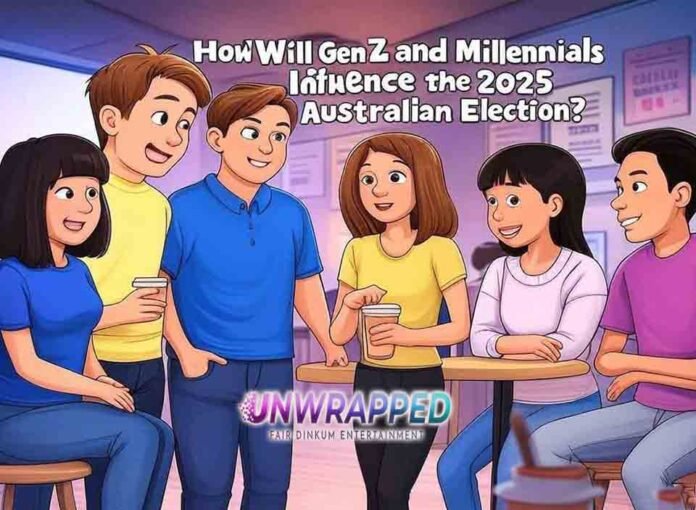From their progressive stance on issues like climate change and social justice to their demand for economic reform, Gen Z and Millennials are transforming Australia’s political landscape. In this article, we’ll explore how these generations will influence the upcoming election and what it means for the future of Australian politics.
Page Contents
ToggleThe Growing Influence of Gen Z and Millennials
Demographic Power
By 2025, Millennials (born 1981–1996) and Gen Z (born 1997–2012) will comprise nearly 50% of the electorate, making them a critical voting bloc.
Key statistics:
- Millennials are now in their prime working and family-building years, making housing affordability, wages, and childcare key concerns.
- Gen Z, with their strong connection to digital activism and progressive values, are focused on climate action, mental health, and education reform.
(Source: Australian Bureau of Statistics)
Voting Trends
Historically, younger voters have leaned toward progressive policies and parties, favoring Labor, The Greens, and Independent candidates over the Coalition. However, this demographic is also known for demanding authenticity and transparency, which could lead to shifting alliances.
Key Issues for Gen Z and Millennial Voters
1. Climate Change
For Gen Z and Millennials, climate change is a non-negotiable priority. They view it as a crisis that demands immediate and bold action.
What They Want:
- Net-zero emissions by 2050 or sooner.
- Increased investment in renewable energy like solar, wind, and hydrogen.
- Stronger policies to combat the effects of extreme weather events.
Party Positions:
- Labor: Advocates for ambitious climate goals through its Powering Australia Plan.
- Coalition: Focuses on technological solutions like carbon capture while maintaining energy security through fossil fuels.
- The Greens: Pushes for an even faster transition to 100% renewable energy and a ban on new fossil fuel projects.
(Learn more: Climate Council)
2. Cost of Living and Housing Affordability
Rising housing costs and stagnant wages have left many Millennials and Gen Zers struggling to get ahead financially.
What They Want:
- Policies to increase housing supply and improve rental affordability.
- Wage growth that keeps pace with inflation.
- Expanded government support for first-time home buyers.
Party Positions:
- Labor: Promises to build 1 million affordable homes under the National Housing Accord.
- Coalition: Advocates for private sector-led solutions and homeownership incentives like the First Home Loan Deposit Scheme.
(Explore housing data: CoreLogic)
3. Mental Health and Healthcare
Mental health has emerged as a critical issue for younger Australians, particularly in the wake of the pandemic.
What They Want:
- Increased funding for mental health services, especially for youth.
- Improved access to bulk billing and affordable healthcare.
- Better support for managing work-life balance.
Party Positions:
- Labor: Plans to expand Medicare funding and increase mental health resources.
- Coalition: Focuses on targeted mental health programs and encouraging private health insurance uptake.
(Find mental health resources: Beyond Blue)
4. Social Justice
Younger generations demand action on issues like gender equality, Indigenous rights, and LGBTQ+ inclusion.
What They Want:
- Stronger policies to close the gap for Indigenous Australians.
- Equal pay and workplace reforms to combat gender inequality.
- Recognition and protections for LGBTQ+ individuals.
Party Positions:
- Labor: Supports Indigenous Voice to Parliament and gender equity reforms.
- Coalition: Mixed support for social justice initiatives, with a focus on maintaining traditional policies.
(Learn more: Australian Human Rights Commission)
How Gen Z and Millennials Will Shape Campaign Strategies
Digital Activism and Social Media
Gen Z and Millennials dominate social media platforms like TikTok, Instagram, and Twitter, making digital engagement essential for political campaigns.
What Works:
- Authentic, relatable content that addresses their concerns.
- Interactive platforms like live Q&A sessions and short, impactful videos.
- Fact-checked information to counter misinformation.
(Explore digital campaigning: ABC News)
Demand for Transparency
Younger voters prioritize authenticity and integrity. Politicians who fail to address scandals or provide clear, honest answers risk alienating this critical group.
Increased Political Participation
Gen Z and Millennials are increasingly involved in grassroots movements and protests, indicating a heightened interest in shaping policies directly. Expect to see more young candidates and activists influencing the 2025 election.
The Role of Independents and Minor Parties
Younger voters are less tied to traditional party loyalties, making them more likely to support independents and minor parties like:
- The Greens, for their strong stance on climate and social justice.
- Teal Independents, who prioritize climate and integrity in politics.
This trend could lead to a hung parliament, with independents playing kingmakers.
(Learn about minor party impact: The Guardian Australia)
Challenges in Engaging Gen Z and Millennials
- Misinformation: Younger voters are vulnerable to false narratives spread online. Clear, factual communication is essential.
- Political Disillusionment: Many feel that politicians fail to represent their interests, leading to lower voter turnout.
- Economic Struggles: Financial pressures can overshadow engagement with broader political issues.
(Read about tackling misinformation: ACMA)
Conclusion: A Generation Poised to Transform Politics
The 2025 Australian Election marks a turning point for Gen Z and Millennials, whose influence will shape the nation’s future. With their focus on climate action, social justice, and economic reform, these generations are demanding bold and innovative solutions from their leaders.
As the election approaches, it’s clear that politicians must listen to and engage with these demographics authentically. The stakes are high, and the choices made in 2025 will resonate for years to come.
What do you think about Gen Z and Millennials’ role in the upcoming election? Share your thoughts in the comments below or join the conversation on social media. Let’s shape the future together—one vote at a time.
External Resources
See Also: Labor vs. Coalition: Comparing Policies Ahead of the 2025 Election











